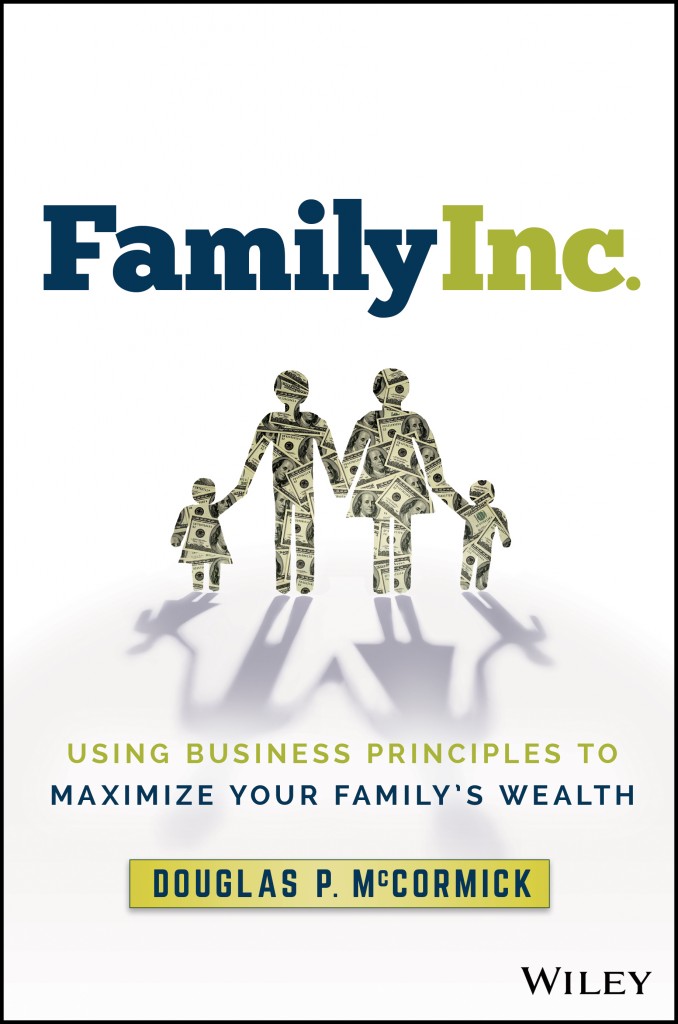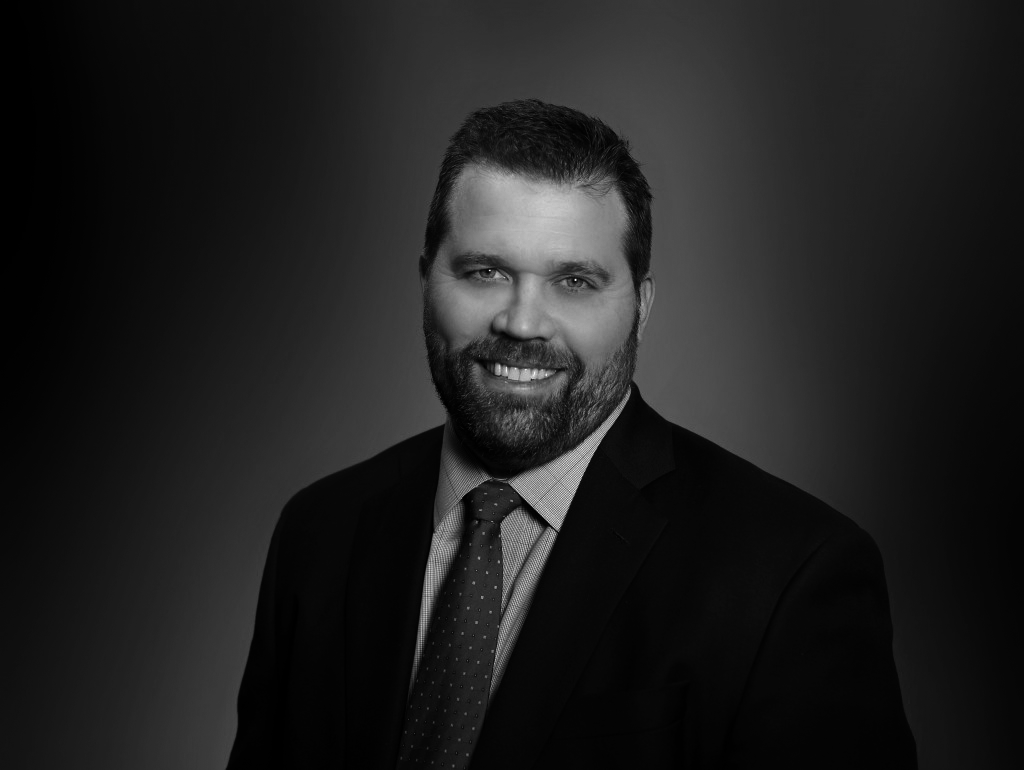Douglas McCormick, author of FAMILY INC.: Using Business Principles to Maximize Your Family’s Wealth (Wiley; April 18, 2016), argues that most people grasp the basics – creating a monthly budget, paying off debt and meeting a savings goal – but they don’t have a holistic and long-term financial plan. So they think they’re doing the right things, but they don’t really know how financially secure their family is. FAMILY INC. applies the time-tested principles of corporate finance to the family’s finances, and teaches readers how to plan, monitor, and forecast their family’s financial future, just like a CFO does with a business. A professional investor, McCormick shares his vast knowledge and advice about financial planning and the value of entrepreneurship with Home Business Magazine readers.
HBM: Why did you write this book?
McCormick: “I wrote this book because I saw a real need and an opportunity to have a positive impact on a lot of people seeking a better way to navigate the financial game of life.
Financial illiteracy is one of the biggest challenges America faces today with negative implications for our national and economic security as well as quality of life among Americans. In spite of its importance, our education system does not effectively teach this important life skill and I found the “do it yourself” resources lacking—too simplistic, too narrow or too technical.
They say money can’t buy happiness and I certainly agree. However, the lack of it sure can make life challenging. My goal for this book is to empower readers with a framework for identifying and navigating life’s most important financial decisions. Improving financial literacy and independence empowers readers to pursue their passions and maximize their potential.”
HBM: How is FAMILY INC. different from other personal finance or investing books?
McCormick: “Most books in this genre fall into one of two broad descriptions: technical how-to books that are action-oriented and rigorous, but not accessible to most of America; or holistic financial advice books that are oversimplified goal-setting tools (i.e. “wouldn’t it be great if we all saved more, spent less and had no debt?”). My approach borrows the best of both worlds. While the book is conversational and the framework addresses every financial decision a family must make, its intellectual rigor is uncompromised. As a result, this book is relevant for any family member regardless of financial sophistication, wealth or life stage.”
HBM: Explain the basic premise of FAMILY INC.
McCormick: “FAMILY INC. is based on the premise that your family is a business, and the Family CFO is responsible for managing that business’ two primary assets: labor and financial capital. The labor business involves “selling” family members’ skills and energy for money, while the asset management business involves growing that money to support your spending needs today and in the future, long after you retire. This new paradigm allows the Family CFO to use many of the everyday tools of the world of business to identify life’s important decisions, understand how to customize your financial plan to your unique circumstances, and monitor your progress on the way to winning the financial game of life.”
HBM: Why does every family need a Chief Financial Officer (CFO)?
McCormick: “Like any business, your family’s business – Family Inc. – must be actively managed. The Family CFO’s responsibilities include managing the family cash, balance sheet and income statement, managing family labor decisions and development, risk management, asset allocation, investments in entrepreneurship, advisor management, tax and estate planning, family financial education and succession planning. These responsibilities are so significant and broad that they can’t be outsourced to an outside professional or team of experts.”
HBM: Your calculation of a family’s net worth includes the value of their labor. How is this different from traditional net worth calculations? What new insights does it provide to the family CFO?
McCormick: “Most financial advisors myopically focus on financial assets when calculating a family’s net worth and making important decisions about risk, asset allocation, duration and retirement. But I believe that a family’s labor – their ability to “sell” family members’ skills and energy for money – is a huge asset that should be factored into the family’s financial picture. When you factor the family’s labor asset into the net worth calculation, you end up with a few unconventional insights, the most important of which is that many people possess the most wealth early in life when their labor assets are high but financial assets are low. For the family CFO, this insight highlights the opportunity cost of wasted labor, unemployment, or “excess” schooling, as well as the negative implications of failing to save or invest some of your income early in adulthood.”
HBM: You argue that you must manage your career like it’s a financial asset. What does this mean, and how does it impact your decisions about job offers?
McCormick: “Labor is a finite and perishable asset, just like other depleting assets like timber or natural gas. Owners of these assets must manage them to maximize their value not in any one year, but over their entire productive life. This framework changes the way we think about education and career choices. For example, while investments in education are significant, they are generally very good investments because they result in higher average pay, less unemployment and more labor capacity, as “white collar” workers can work later in life. When it comes to job offers, viewing your labor as an asset means you should prioritize opportunities that allow you to maximize the asset over the long-term, based on the following factors: a) employment at a company with good financial and growth prospects; b) lots of flexibility to develop skills on the job that are applicable other industries and companies; and c) the opportunity to improve your personal brand based on the company’s reputation or your role in the organization. Most people focus on current compensation when evaluating a job opportunity. While that is certainly important, in the long run, the variables outlined above are likely to drive long-term value more than starting salary.”
HBM: Why should families ditch the budget for an income statement and balance sheet?
McCormick: “I find people get distracted with detailed budgets, spend too much time tracking meaningless information, and fail to focus on the issues and decisions that really matter. Additionally, few people compare their actual results to their budget, and then change their behavior accordingly. For this reason, I prefer a monthly high-level review of an income statement, broken into fixed costs and variable costs, as well as a balance sheet, which shows the family’s assets, liabilities, and net worth. These statements tell the family CFO how much the family is saving, how much cost can be eliminated quickly if need be and how much liquidity (cash) they have on hand if needed. The primary purpose of monthly financial reporting is to track savings rates and avoid financial distress. For these purposes – simple is better. Readers can create their own income statement and balance sheet on my website, www.familyinc.com.”
HBM: What is the FAMILY INC. approach to investing?
McCormick: “In short, passive investing (indexing to the market) is better than active investing (trying to beat the market). As I explained in question six, I believe active investment in education, entrepreneurship and career development are compelling ways to increase a family’s wealth. I also believe that active investing in the public markets can be very profitable. However, very few families are well-positioned to be successful active market investors—they lack the time, skill and information required to effectively compete with active investors. For this reason, I recommend passive management, which means a portfolio that mirrors a market index (versus trying to beat the market with active management). Your ultimate goal is to maximize long term after tax, after fee purchasing power, and the best way to achieve this is with a diversified, high equity, low fixed income index portfolio with minimal fees or tax leakage (i.e. ETFs).”
HBM: Why do you advocate so strongly for entrepreneurship?
McCormick: “I believe entrepreneurship is the surest path to financial independence and true wealth creation for the following reasons:
- Entrepreneurship provides a vehicle to shelter your labor and your capital from competition. In the labor market, we compete for jobs and salaries. And high competition in the capital markets means we are unlikely to achieve more than 5% real returns over the long-term. Taken together, competition in both labor and capital means you’re unlikely to create true wealth through traditional employment. When you become a business owner, you combine your labor and capital assets. And depending on the type of business you start, you can generate much higher annual returns on your investment—in some cases as high as 50% for a good service business, versus 5% in the capital markets.
- Entrepreneurship is an effective way to increase the duration of your working career. Business owners are often able to extend their careers many years by transitioning out of the business over time rather than an abrupt retirement. The more years you can work, the more time you have for your money to continue to grow, which will put you in a much better financial position by the time you retire.
- Entrepreneurs sell a going concern. If a business owner is able to create a team and a business that is capable without him, then he has created a valuable asset he can sell. And the income he can earn from selling a company can be much higher than the income he would earn through a salary.
- Entrepreneurship is more tax efficient. The US tax code encourages business creation, which means a lower tax burden for entrepreneurs than highly-paid employees.”
HBM: Most people would like to jump-start their child’s success with an inheritance. What is your advice for preparing kids to manage an inheritance – and the family’s finances – responsibly?
McCormick: “First of all, it is important to acknowledge that without proper management, values and education, wealth can be a liability and result in some very unproductive behaviors for young people. With this in mind, if parents can impart the correct skills and attitudes with an inheritance, it can help the next generation successfully perpetuate Family Inc.
When contemplating leaving an inheritance to your child, keep these principles in mind:
- Financial independence starts with education and career management. Regardless of the family situation, encourage your child to make choices in education and careers that maximize the value of their labor, which will in turn promote their financial independence.
- Establish periodic meetings to provide an overview of the family’s financial picture and performance. Most families don’t talk about money. But by including children in these conversations early in their financial development, they will have years to learn by watching the parents manage the family business.
- Promote open dialogue among all family members that encourages candor, honesty and sharing of ideas and information. During these conversations, it is also important to establish that ultimate decision-making regarding these financial choices resides with the parents. You are soliciting their input and creating an opportunity for them to learn, but you are not relinquishing decision authority. Establishing these boundaries prevents your child from feeling that they are entitled.
- Create opportunities for failure. Failure is an important part of learning, As the Family CFO, you should create opportunities for your child to assume financial responsibility—and likely fail. Give them access to a credit card or autonomy to spend budgeted money. By doing this, you create valuable teaching opportunities and chances to fail with relatively low cost. Don’t wait until you are gone for them to take on their first real responsibilities—and make mistakes that have real consequences.
- Create financial incentives to promote engagement and participation. Incentives affect all kinds of human behavior, including how we handle money. Creating incentives such as subsidizing school costs, paying a family member to help manage aspects of Family Inc., or matching your child’s savings are all good ways to promote desired behaviors and preparing them for the responsibilities related to your gift.
- Lastly, remember that your evolution to becoming the Family CFO has been a process that, for many of us, occurs over a lifetime. Many of the concepts and skills required to be an effective Family CFO are complex and take years to master. One of your primary responsibilities as the Family CFO is to be a teacher, which involves patience.”
HBM: You are donating thousands of books to veteran and student veteran service organizations and are also donating 100% of your royalties to veteran causes through Memorial Day. Why?
McCormick: “FAMILY INC. is intended to empower every American with the tools required to achieve financial independence. However, as a veteran Army officer, I am also using the book to empower the veteran community with financial education. Most Americans appreciate the sacrifices our service members have made for our country, but few understand the unique financial challenges our veterans face while serving, upon career transition to the civilian workforce, and upon retirement. These service members are incredibly talented, have exceptional life experiences and a “can do” attitude—they don’t need our charity. However, they do need opportunities to prove themselves and assistance with effectively redeploying their skills to a new field in the civilian work force. I believe that FAMILY INC. can serve as a valuable roadmap to maximizing their opportunity and achieving financial independence. So I have partnered with numerous veteran service organizations focused on veteran financial literacy, veteran transition and veteran empowerment.” HBM
—
About Doug McCormick
 Doug McCormick has a lifetime of experiences that provide the foundation for the framework, principles and tools in Family Inc. As a professional investor, he has spent two decades managing money for institutional clients such as insurance companies, pension funds, entrepreneurs and high net worth families. Unlike Wall Street money managers who seek to generate paper profits through passive investing, Doug partners with families and entrepreneurs to build and grow their businesses to create sustainable long-term value. His own journey to achieving financial independence began at the age of seven, when his Dad helped him purchase AT&T stock. During his professional career, he has gone from active duty Army officer with a young family, to grad school student, to employee at a Wall Street investment bank, to private equity investor and finally entrepreneur through co-founding HCI Equity with his partners.
Doug McCormick has a lifetime of experiences that provide the foundation for the framework, principles and tools in Family Inc. As a professional investor, he has spent two decades managing money for institutional clients such as insurance companies, pension funds, entrepreneurs and high net worth families. Unlike Wall Street money managers who seek to generate paper profits through passive investing, Doug partners with families and entrepreneurs to build and grow their businesses to create sustainable long-term value. His own journey to achieving financial independence began at the age of seven, when his Dad helped him purchase AT&T stock. During his professional career, he has gone from active duty Army officer with a young family, to grad school student, to employee at a Wall Street investment bank, to private equity investor and finally entrepreneur through co-founding HCI Equity with his partners.
As Managing Partner at HCI Equity, Doug oversees all aspects of the firm’s strategy, investments and operations with his partners. Before joining HCI Equity, he worked as a Managing Director at Thayer Capital and in the Investment Banking Division of Morgan Stanley & Co. Doug previously served as a Captain in the U.S. Army’s 25th Infantry Division where he earned the Airborne, Air Assault, Expert Infantryman, and Ranger qualifications. Doug holds a Master of Business Administration from Harvard Business School and a Bachelor of Science in Economics from the U.S. Military Academy at West Point, where he graduated at the top of his class while serving as First Captain and Co-Captain of the Army Wrestling team.
Doug’s personal passions include his family (wife Michele, son Mike and daughter Kelly), his dogs (Mac and Sammy), hunting, outdoor activities, politics and veteran causes. Doug serves as a board member of Team Red White and Blue (www.teamrwb.org), and is honored to be a Henry Crown Fellow, class of 2011.
Find a Home-Based Business to Start-Up >>> Hundreds of Business Listings.















































